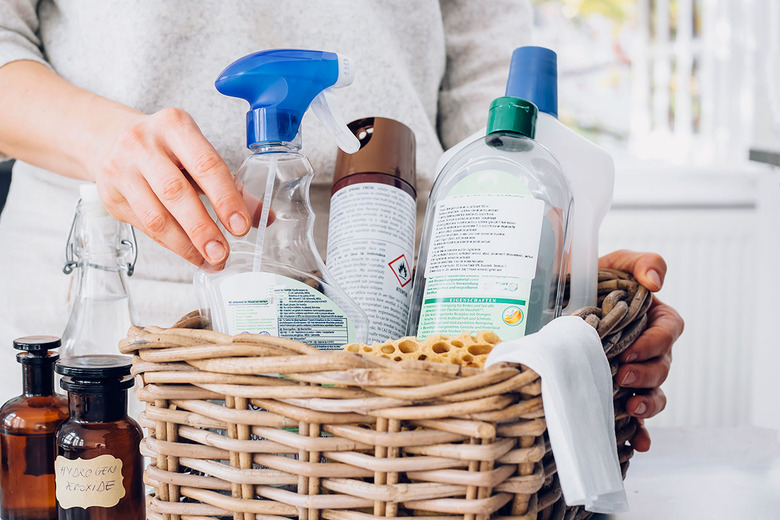How Much Bleach To Put In A Spray Bottle To Sanitize?
Warning
When using sanitizing products such as bleach, the CDC recommends the following: "Never mix bleach with ammonia or any other cleaner. Wear rubber or other non-porous boots, gloves, and eye protection. Try not to breathe in product fumes. If using products indoors, open windows and doors to allow fresh air to enter."
The National Capital Poison Center also cites spray bottles as a hazard for children. They specifically state, "Cleaning products in spray bottles are now the leading source of cleaning products that poison children. Most injuries are to the eyes and head. It's important to wash the skin and eyes right away with lots of running water." It is recommended that spray bottle nozzles are stored in the "off" position and that the bottles are kept out of children's reach. When using the bottle for cleaning purposes, the National Capital Poison Center advises that children be kept in a separate room.
Chlorine bleach is a product you likely use to clean around the house. According to Clorox's product page for regular bleach, the product kills 99.9% of germs and bacteria. "Bleach is generally used to inactivate contaminating bacterial spores, but [is not] safe as the major component for hand disinfectant — it's just too caustic to the skin," Dr. Shuhan He, an Emergency Medicine physician at the Harvard Teaching Hospital Affiliate Massachusetts General Hospital, tells Hunker. So while you should avoid bleach touching the body, you can still use it to disinfect your home. But, should you use it in a spray bottle?
"Bleach is a good sanitizer because it has been demonstrated to have activity against almost all bacteria, viruses, and fungi," Dr. Eric Lee — a medical director of several nursing homes, who also works in the ER and as a medical expert for InvigorMedical.com — tells Hunker. "Bleach's main effects are local irritation and irritation to the skin and mucus membranes — for this reason, I probably wouldn't use a spray bottle. Appropriate bleach use requires creation of a solution so that the ingredient concentration can be controlled."
Though a spray bottle isn't recommended, with the coronavirus making headlines, the CDC states that diluted household bleach solutions should be effective when it comes to cleaning and disinfecting to prevent the virus. "Unexpired household bleach will be effective against coronaviruses when properly diluted," they write, emphasizing that the bleach must be unexpired. One should also wear disposable gloves when disinfecting, should dispose of the gloves after each use, and also wash their hands after removing the gloves. Before using the bleach solution on a surface, you will want to clean the surface using soap and water.
To make the bleach solution, the CDC recommends mixing 5 tablespoons (1/3 cup) of bleach per gallon of water. "Bleach concentrations vary, and people should consult the label to prepare an effective solution," Dr. Lee adds. "The most common concentration is 5.25% sodium hypochlorite in water." If, instead, you are looking to buy a product the Environmental Protection Agency (EPA) has registered for use against the coronavirus — which includes household bleach products — you can find that information here.
Alternatively, when using bleach to clean an area that has been affected by mold, the CDC advises using 1 cup of household bleach in 1 gallon of water. You can wash affected surfaces with the bleach mixture, use a stiff brush to scrub them if they are rough, rinse the surfaces with clean water, and then allow them to air dry.
"For other contaminations (blood, fecal matter, or vomitus), I would use half a cup and a gallon of water. This creates a 1:50 solution," Dr. Lee advises. "I would be loathe to describe a situation in which a typical family would need something stronger than that. There are test strips for higher concentrations, but again, a normal person doesn't need to go crazy here." He adds that specific pathogens have specific recommendations when it comes to disinfection, so you should consult the CDC when aiming to disinfect for a particular virus or bacteria.
Ultimately, while bleach can be great for disinfecting around the house, it's important that you follow all safety precautions while doing so.
